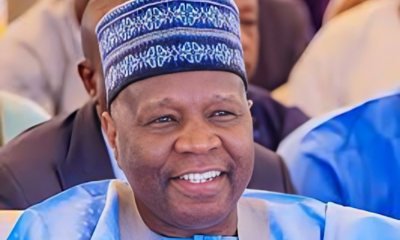NEWS
Crude Vessel Burning Consists Environmental Hazard, Right Group Cautions Military

Mike Tayese, Yenagoa
The Nigerian military has been advised against the burning crude oil vessel. the Environmental Rights Action/Friends of the Earth Nigeria (ERA/FoEN) said it constitutes a grave environmental hazard.
The Executive Director of ERA/FoEN, Chima Williams, stated this while commenting on the conduct of Nigeria’s security operatives trying to stop oil theft in the Niger Delta, especially in recent times.
According to him, the burning of crude oil-laden vessels disposes of a high level of chemical content into the water bodies, which destroys the eco-lives and aquatic organisms that humans need to survive.
“Destroying such vessels with their crude contents produces high-level chemical debris that follows tidal movements to other parts of the country.
This kind of devastation destroys the aquatic organisms needed to satisfy man’s nutritional and survival needs.What is discharged includes chemical contents from the crude and the vessels that are harmful to human health. The health implications of such activities may not have immediate effects but will be transferred to the people who inhabit these areas, as the primary occupations of the Riverine people are fishing and farming, which are dependent on the surrounding waters.”
He further added that the destruction of crude oil-laden vessels will also deprive the people of their sources of livelihood when the chemical waste from the burnt vessels and crude oil comes in contact with the environment, killing aquatic life and poisoning the surrounding soil.
Commenting on the economic implications of such activities, Williams further stated that destroying and wasting away stolen crude is a disservice to the country’s economy, as such crude could generate funds that will build infrastructure and better the lives of the people.
“Destroying batches of crude that run into millions is equivalent to denying the nation and its people the revenue that can be derived from such large amounts of crude. This is a country in dire need of resources to rebuild the economy, to build infrastructure, and to better the lives of the people. The country is in heavy debt, yet we are destroying sources of enhancing our economy. The burnt vessels can be transformed for other uses like enhancing the work of seafarers in the country.”
Barrister Williams also spoke on the legal implications of the destruction of vessels laden with stolen crude, describing it as the destruction of evidence that could lead to the proper prosecution of the case.
He further stressed that such actions wipe away the key principles of the rule of law, as the chances of conviction or proper acquittal are no longer visible. According to him, this is a denial of justice to the nation, the individuals involved, and the victims of their negative operational conduct and activities.
He called on the military and security operatives to put an end to the burning of crude oil-laden vessels, as it goes against every tenet of environmental protection and environmental health.
He called on the government at all levels to move away from such hazardous means of curbing oil theft and to map out effective action plans that will protect the environment, protect the livelihood of the people in their pursuit of justice, and also create an economic value from seized crude oil and the conveying vessels.
Foreign News
U.S Will Start Revoking Visas for Chinese Students

The United States says it will begin revoking visas of Chinese students and tighten screening for future applicants from China and Hong Kong, the US State Department said on Thursday.
“The U.S. will begin revoking visas of Chinese students, including those with connections to the Chinese Communist Party or studying in critical fields,” US Secretary of State Marco Rubio said on social media platform X.
In a press release, the State Department stated that it would also revise visa criteria to enhance scrutiny of all future visa applications from the People’s Republic of China and Hong Kong.
It was not immediately clear how many students currently in the United States would be affected or whether any exemptions would apply.
According to the Institute of International Education (IIE), about 277,000 Chinese students were enrolled at U.S. universities during the 2023-2024 academic years, making them the second-largest group of international students after those from India.
The U.S. already applies strict visa rules for Chinese nationals in certain academic disciplines, particularly in science and technology.
China’s Foreign Office said it filed a complaint against the unjustified step.
Washington’s discriminatory actions expose the lie of freedom and openness that the U.S. has always boasted about, said spokeswoman Mao Ning in Beijing.
The new measures come amid reports that the State Department has halted new visa interviews for international students and exchange visitors while it reviews screening procedures, including expanded checks on social media activity.
The pause reportedly affects F, M and J visa categories, including those for students, interns and au pairs, with further instructions expected in the coming days.
However, relations between Washington and Beijing have deteriorated further since U.S President Donald Trump took office in January.
The two economic powers are engaged in a deepening trade dispute and competing for global influence across multiple fronts.(dpa/NAN)
Education
How female Medicine Degree Holder Abandoned Certificate for Carpentry- Bugaje

The Executive Secretary, National Board for Technical Education (NBTE), Prof. Idris Bugaje has expressed the need to promote inclusivity, especially for women and persons with disabilities in technical education.
Bugaje stated this in Abuja while assessing the impact of President Bola Tinubu’s administration after two years in office.
He appealed for greater gender inclusivity in vocational and technical education, stressing that deliberate policies such as scholarships and incentives could help bridge the gender gap.
In support of his position, Bugaje shared an inspiring story of a female medical doctor who abandoned her medical career to pursue carpentry.
“There is a story I want to share with you, about a girl who was interested in becoming a carpenter.
“The father was a carpenter and they were four children in the family, three boys and herself.
“Whenever she joined the boys to the workshop, the father would send her away, saying, `you are a girl, go back to the house, you are not supposed to be a carpenter’’.
“Without giving considerations to the passion of the young girl, the father sent her to a medical school.
“She graduated with the MBBS, went and did the one-year internship after graduation, and chose a role as a medical doctor.
“After that, she came back to the father, returned the MBBS certificate to him, and thanked him.
“Afterward, she told the father that her passion is in carpentry, not to practice as medical doctor,” Bugaje narrated
He added that after spending seven years on medical training, the father had no option but to send her to Turkey to learn how to make furniture.
Addressing cultural and societal barriers often faced by young women in technical fields, Bugaje appealed to parents to support their daughters’ interests in trades like plumbing, electrical installation, and carpentry.
He also called on policymakers to prioritise passion and skill development among youth, especially girls, noting that such encouragement could lead to greater innovation and self-reliance.
“If they want to become carpenters, ICT experts, or POP artists, allow them.
“In skills’ training, passion is very important. That’s what motivates children and helps them innovate.
“We need to harness these innovations if the country is to move forward and rise beyond being a third-world nation,” he said.
He emphasized the need to have deliberate policies to encourage women to come into TVET through scholarships and other incentives. (NAN)
Education
WAEC Apologies for Conducting English Exam Late, Cites Leakage Prevention

The West African Examinations Council (WAEC) has apologized for delay in conducting English Language Paper 2 in the ongoing 2025 West African Senior School Certificate Examination (WASSCE).
The took place on Wednesday evening.
In a statement by Moyosola Adesina, Acting Head of Public Affairs Department of
WAEC, the council said that it encountered challenges.
”While maintaining the integrity and security of our examination, we faced considerable challenges primarily due to our major aim of preventing leakage of any paper.
“We recognise the importance of timely conduct of examinations and the impact of this decision on candidates, their schools and parents, and we sincerely apologise for any inconveniences caused,” WAEC stated.
It said that it successfully achieved its objective but it inadvertently impacted the timeliness and seamless conduct of the examination.
“In spite of our best efforts, we encountered logistical hurdles, security concerns and socio-cultural factors that negatively influenced our operations,” WAEC said.
The council re-affirmed its commitment to upholding the highest standard in examination conduct, and pledged to continue to promote academic excellence. (NAN)
























